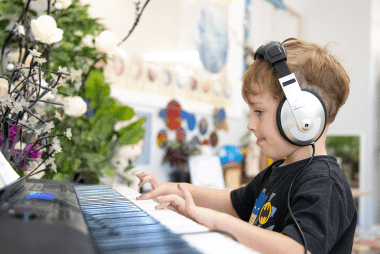
Did you know that music is one of the few activities that uses both the logical and creative sides of the brain? The benefits of music in the early years have been explored in many different studies, with one study by the Brain and Creativity Institute finding that musical experiences in childhood can speed up the development of children’s brains in processing sound, language development, speech perception and even reading skills.
Music and movement are something that comes naturally to children of all ages. Even the youngest infants will bounce, sway, smile or wave their hands along to their favourite tunes. It’s common for children of pre-school age to make up their own songs and rhymes, and often sing to themselves during play. Music-making is a natural part of children’s general play that ignites all areas of their cognitive development, including literacy and numeracy skills, emotional intelligence and social development.

The Benefits of Music in the Early Years
According to Early Childhood Australia, exposing children to music in the early years has many benefits for child development. Learning to understand music engages many learning skills required to build school readiness including:
- Listening and remembering information through songs and rhymes
- Numeracy and Counting – music is set to a beat, which engages children in mathematical concepts such as rhythm, counting and keeping time
- Speech Recognition – recognising and reproducing words, which also builds children’s vocabulary and communication skills
- Physical balance and development of motor skills needed to dance and move our bodies along to a beat, as well as control sounds and movement
- Problem-solving through listening
- Opportunities to create, compose and improvise which builds children’s creativity
- Social skills such as taking turns, sharing ideas and values, and playing together
- And much more!

Supporting Your Child’s Musical Development at Home
There are so many ways to incorporate music and movement into your child’s play. You don’t need to be a musician or have any special skills or equipment on hand. Being musical with your child can be as simple as clapping a beat, singing a nursery rhyme, or even turning on the radio and moving to your favourite songs!
- Early Childhood QLD has some great suggestions for making simple instruments at home. You could fill a water bottle with rice or buttons to make a shaker, make clap sticks out of chopsticks or dowelling, or fashion a drum set out of different sized pots and pans
- Use rhymes and songs to communicate with your child. Incorporating songs into daily routines can be especially comforting for infants. You could sing a short song about bath time, say a nursery rhyme during nappy change time, or play quiet peaceful music to soothe them at bedtime
- Get moving to your favourite tunes. Dancing along to music is a fun way to move our bodies that can instantly put a smile on both your and your child’s faces, as well as get some active minutes into the day
Remember that children are experts at play, so when it comes to music we only need to sing and do; no explanations required!

Music at Busy Bees
At Busy Bees we encourage music in play as it provides children with wonderful opportunities for movement, creativity, language, expression and connections. Our skilled Educators incorporate music and movement into our educational programs in many different ways, including:
- Having a variety of musical toys and instruments available to children to explore at any time
- Incorporating songs and rhymes into games and daily activities
- Introducing children to different kinds of music from varied backgrounds and genres
- Educators with special skills in music will play instruments for children and share their knowledge
- Engaging in movement games such as dancing and yoga
- Having musically-inclined parents and teachers visits the Service to share their talents with the children
- The Busy Bees Unleashing Potential (UP) App also has a music and nursery rhyme function to assist Educators to deliver musical experiences to children
Need ideas for supporting your child’s learning at home?
Ask your child’s educator about UP at Home. Our home learning program has so many fun and educational activities that are easy to do with your child at home.
